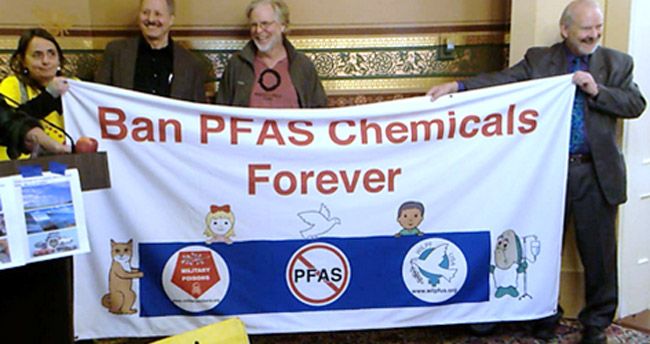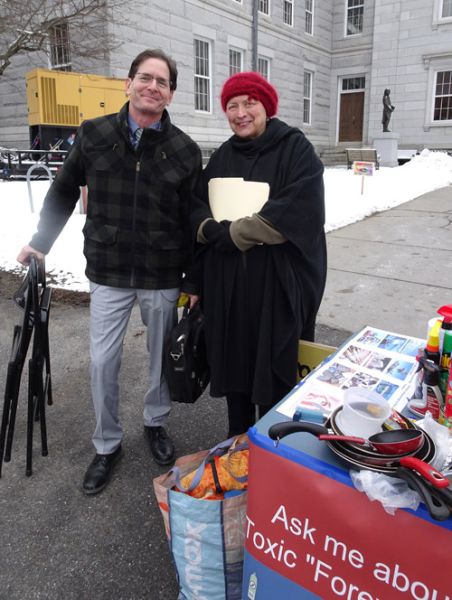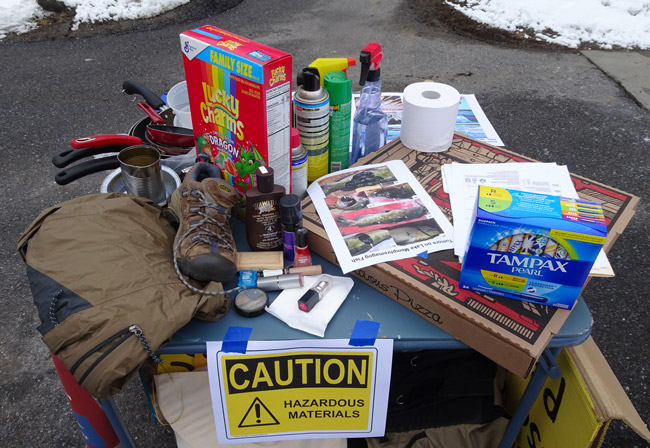WILPF’s PFAS Coalition Calls for Legislation in VT
Published on March, 29 2024
From left to right: Frankie Anni, John Brabant, Buzz Ferver, and Bob Ackland hold the VT PFAS/Military Poisons banner at the January 30th Press Conference in the Montpelier Statehouse; Credit: PFAS Coalition
by Marguerite Adelman
March 2024
Individuals impacted by widespread pollution from toxic PFAS (per- and poly fluoroalkyl substances or forever chemicals) and pesticides joined the Vermont PFAS/Military Poisons Coalition and numerous other environmental groups for a day of legislative action at the Montpelier Statehouse on Tuesday, January 30th.
Community members braved the cold to greet legislators as they entered the Statehouse. With table displays of the numerous products that contain forever chemicals, activists greeted and spoke with representatives, raising awareness about the national PFAS and pesticide contamination crisis, sharing their platform for the 2024 legislative session.
“We are calling on our legislators to ban PFAS as a class of chemicals, reduce the use of pesticides by 50% by 2030, ban landfills from releasing PFAS-containing leachate into our waterways, end sewage and wastewater overflows, and ban the spreading of biosolids [aka sewage plant sludge and septic tank waste] on our agricultural lands until we can prove that they are safe to use,” stated Marguerite Adelman, Coordinator of the Vermont PFAS/Military Poisons coalition.
 Based on this vision for Vermont, groups present urged legislators to support crucial, health-protective bills like S.25, an act that would regulate these toxic chemicals in cosmetic products, textiles, and synthetic turf, and S.197, an act relating to the procurement and distribution of products containing PFAS, especially in pesticides, and monitoring adverse health conditions attributed to PFAS.
Based on this vision for Vermont, groups present urged legislators to support crucial, health-protective bills like S.25, an act that would regulate these toxic chemicals in cosmetic products, textiles, and synthetic turf, and S.197, an act relating to the procurement and distribution of products containing PFAS, especially in pesticides, and monitoring adverse health conditions attributed to PFAS.
Left: Vermont’s Lt. Governor David Zuckerman chats about PFAS legislation with Marguerite Adelman, VT PFAS/Military Poisons Coordinator, outside of the Montpelier Statehouse; Credit: PFAS Coalition
After a morning of engagement with legislators, the coalition gathered in the State House for a press conference, during which speakers from multiple groups shared their vision for a healthy, thriving and toxin-free state.
James Ehlers, Lake Champlain International, noted that “The Coalition has been educating state lawmakers on the dangers posed by this poisonous class of chemicals for years. It is now up to the politicians. Will they protect the public – Vermont farmers, families, our food and water, our fish and wildlife – or will they continue to protect the polluters poisoning us for their own profit? How they vote on S.25 and S.197 will reveal their priorities.”

Products containing PFAS; Credit: PFAS Coalition
Legislation about pesticides is a particular passion of Sylvia Knight, Vermont Pesticide and Poison Action Network (VT PAPAN). During the press conference, Sylvia stated: “We declare a Citizens’ Mandate to reduce pesticides because every year the Agency of Agriculture reports use of over 1 million pounds of pesticide active ingredients, not including the unidentified ingredients which can include PFAS and be a large portion of pesticide products. Nor does the data include pesticides purchased over the counter by individuals. This accounting system must be reformed!” Members of VT PAPAN are supporting H.706, an act relating to banning the use of neonicotinoid pesticides.
PFAS in landfills has become a huge concern for those who live near the Coventry Landfill near Lake Memphremagog. Henry Coe, Don’t Undermine Memphremagog’s Purity (DUMP), noted that “We in the Northeast Kingdom live with Vermont's only permitted private landfill, just one mile upslope from Lake Memphremagog, a drinking water reservoir for 175,000 Quebec neighbors. To that landfill goes the largest portion of PFAS in our waste stream. The landfill operator's trucks are hosts to PFAS, our most toxic and dangerous invasive species. While the single landfill model may be business friendly, in my opinion, it is decidedly people and environmentally unfriendly. We must reset the mentality of 'out of sight- out of mind' for the garbage we as individuals, we as communities, generate." DUMP is supporting H.48, an act relating to solid waste management.as well as H.674, an act relating to regulation of septage and other materials containing PFAS.
“We are asking our legislators to value people and the planet over big polluters,” said John Brabant of Vermonters for a Clean Environment, “and that means passing bills that protect our drinking water, our food and farmland, and the health of generations to come.”
The advocacy day was live-streamed by ORCA Media; was the top story on WCAX News; and was a feature story on My Champlain Valley.
The WILPF US Earth Democracy and Military Poisons website can be found at www.militarypoisons.org . On the website, detailed information about the following states, military sites, and PFAS are included: California, Connecticut, Maine, Maryland, Massachusetts, New Hampshire, New York, Rhode Island, and Vermont. There is also a Military Poisons Facebook page and a Vermont Military Poisons Project Facebook page.



